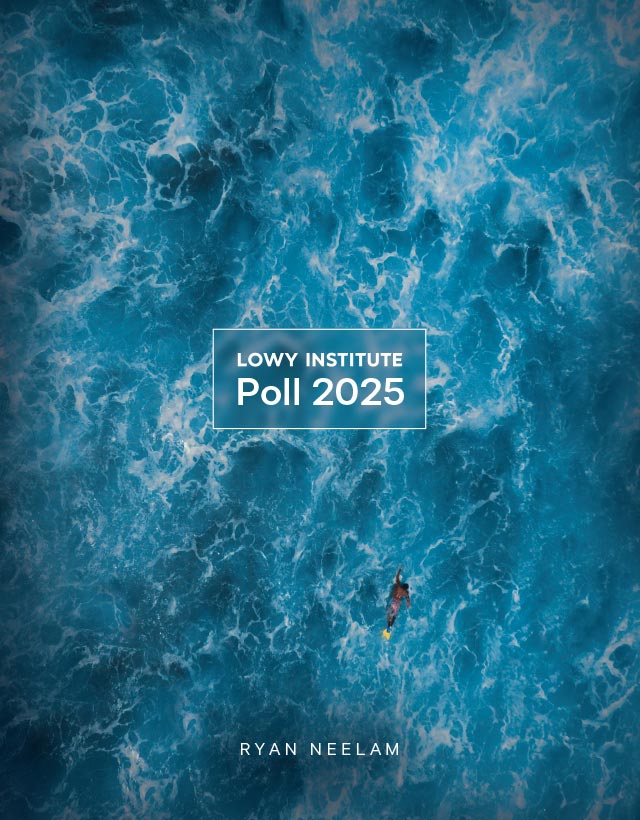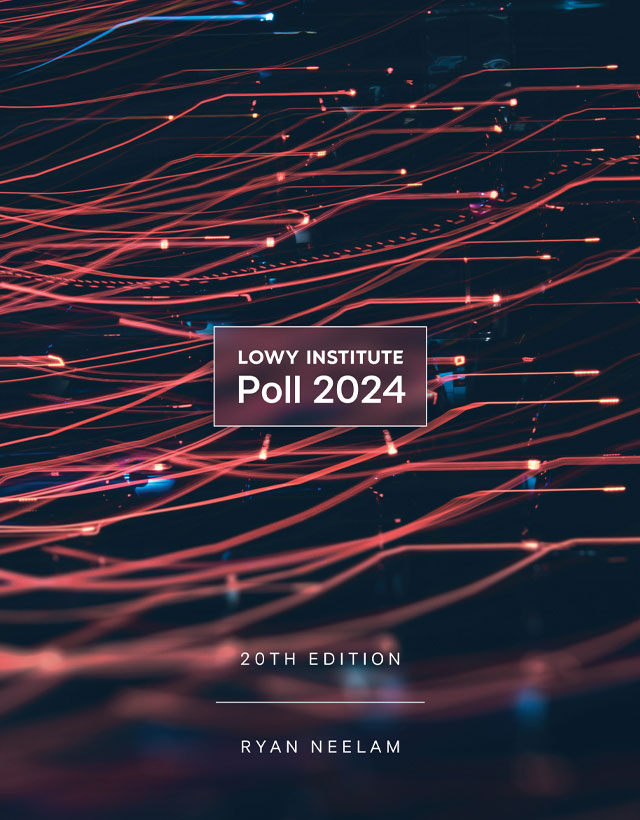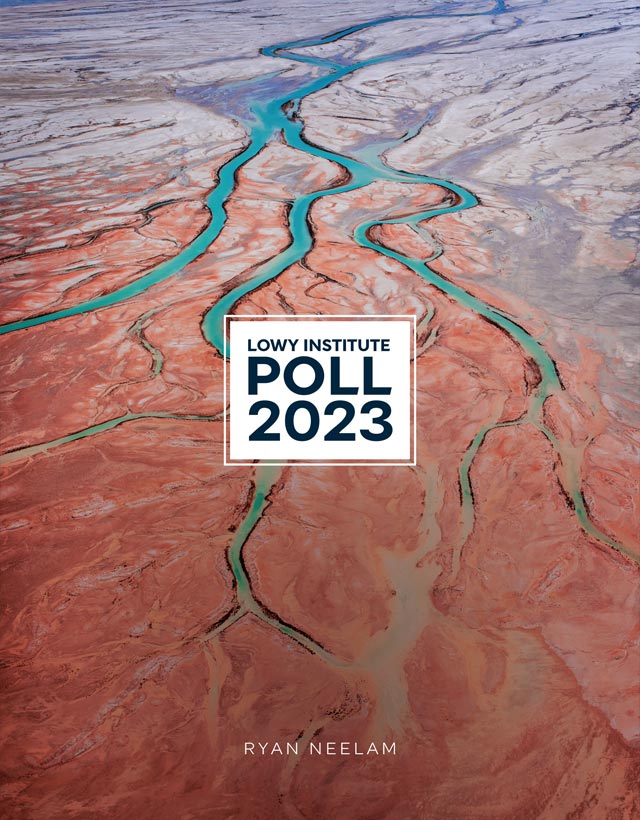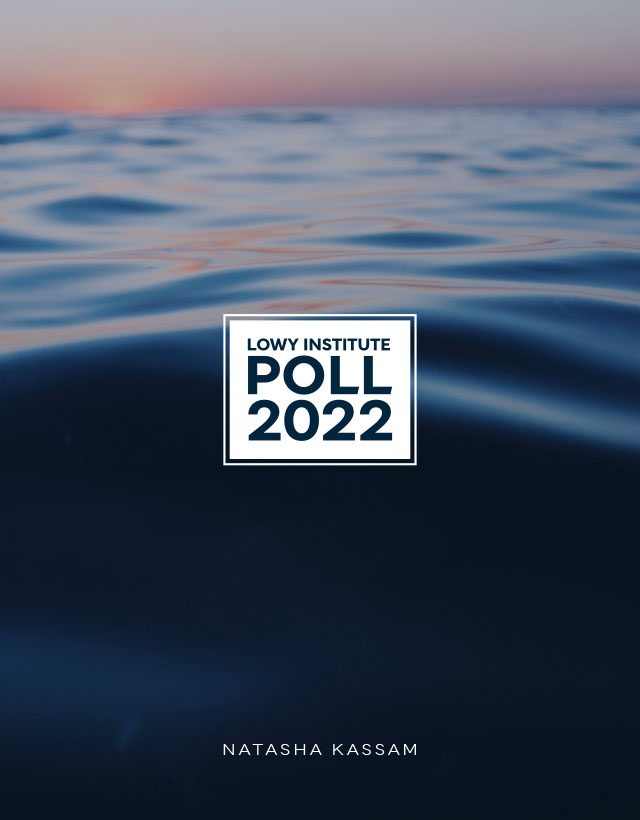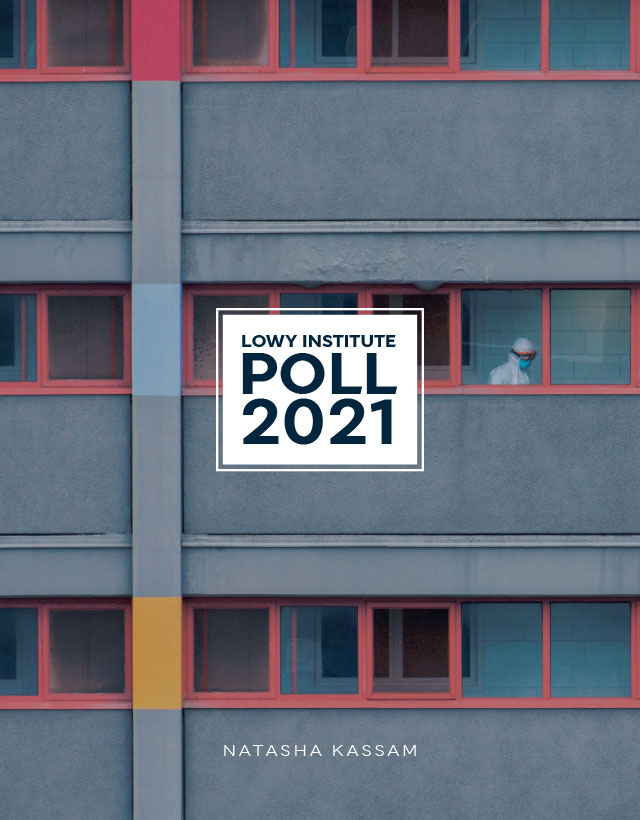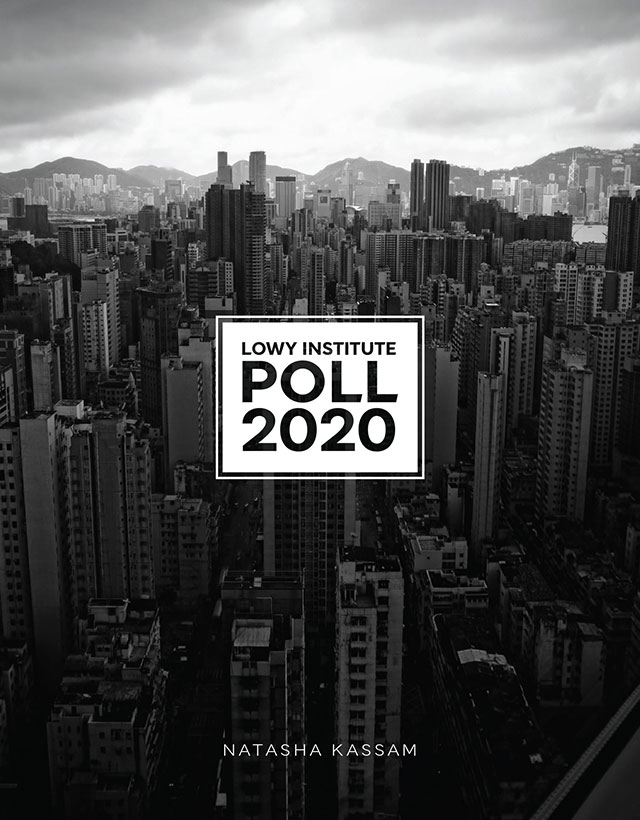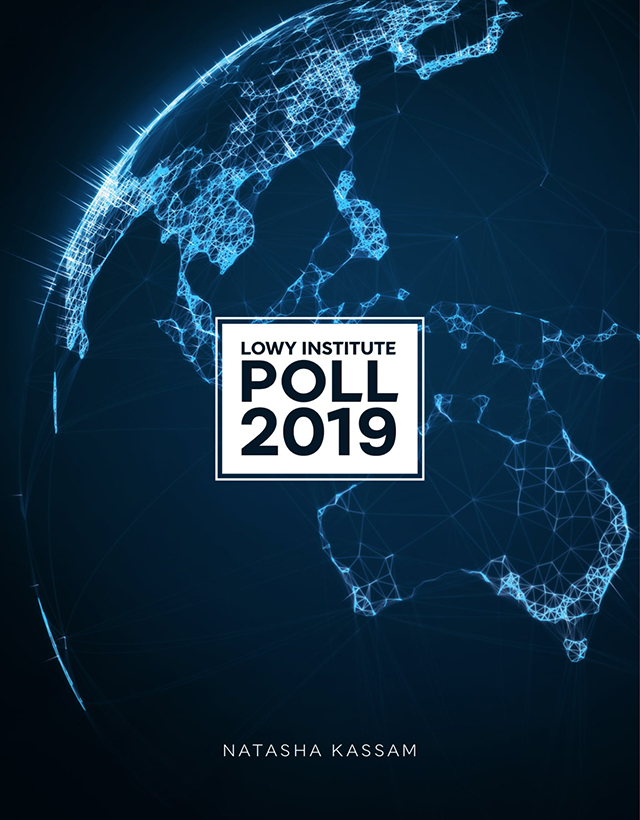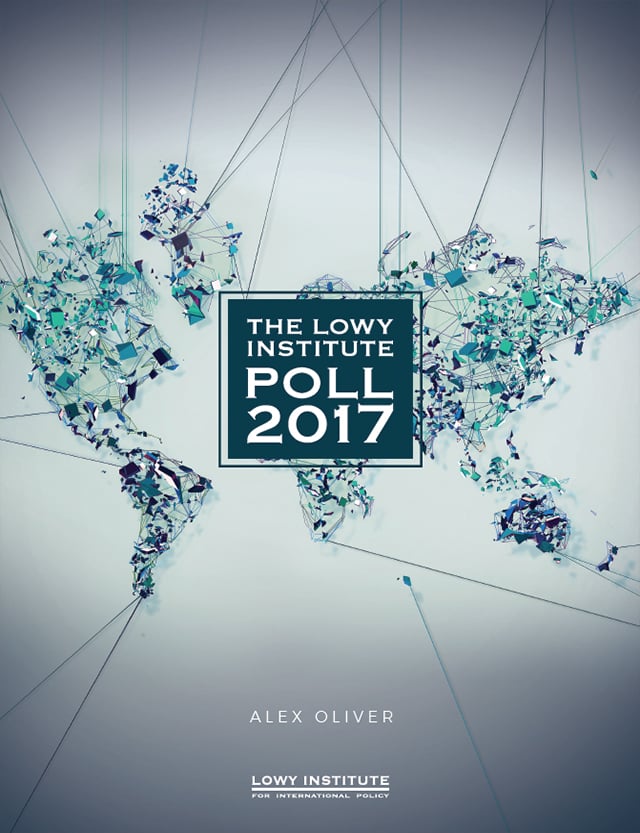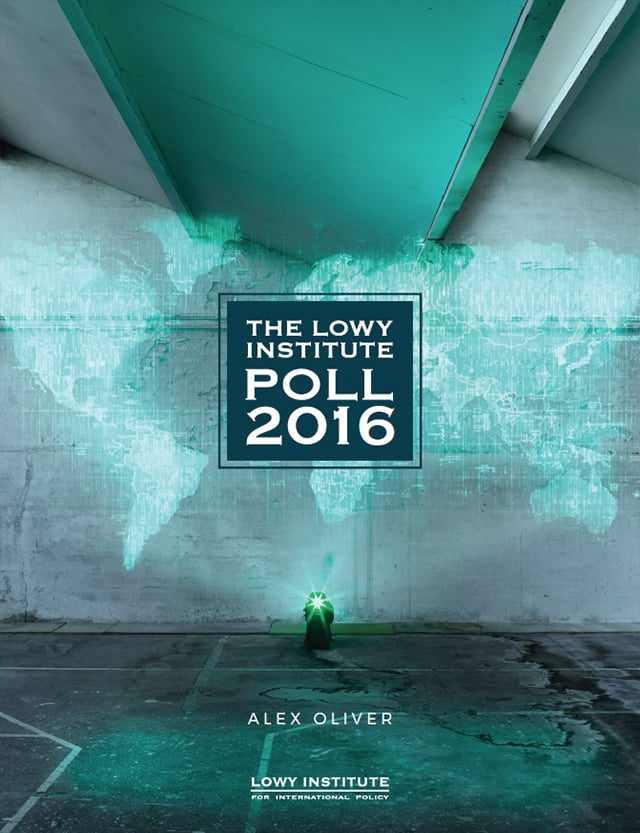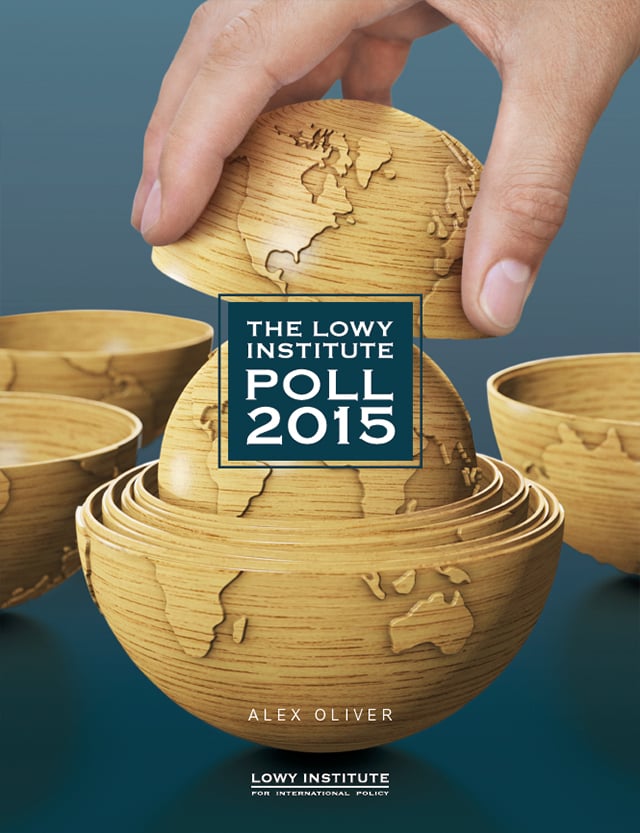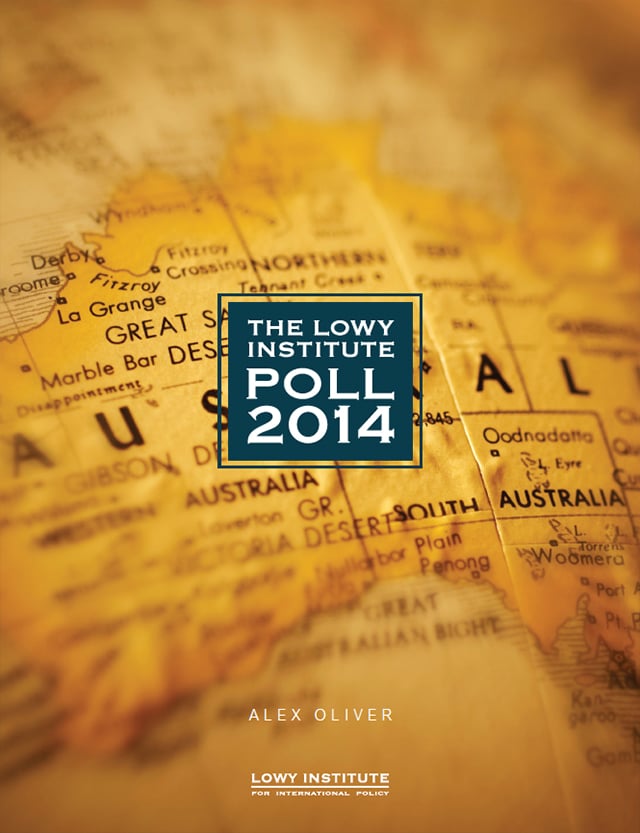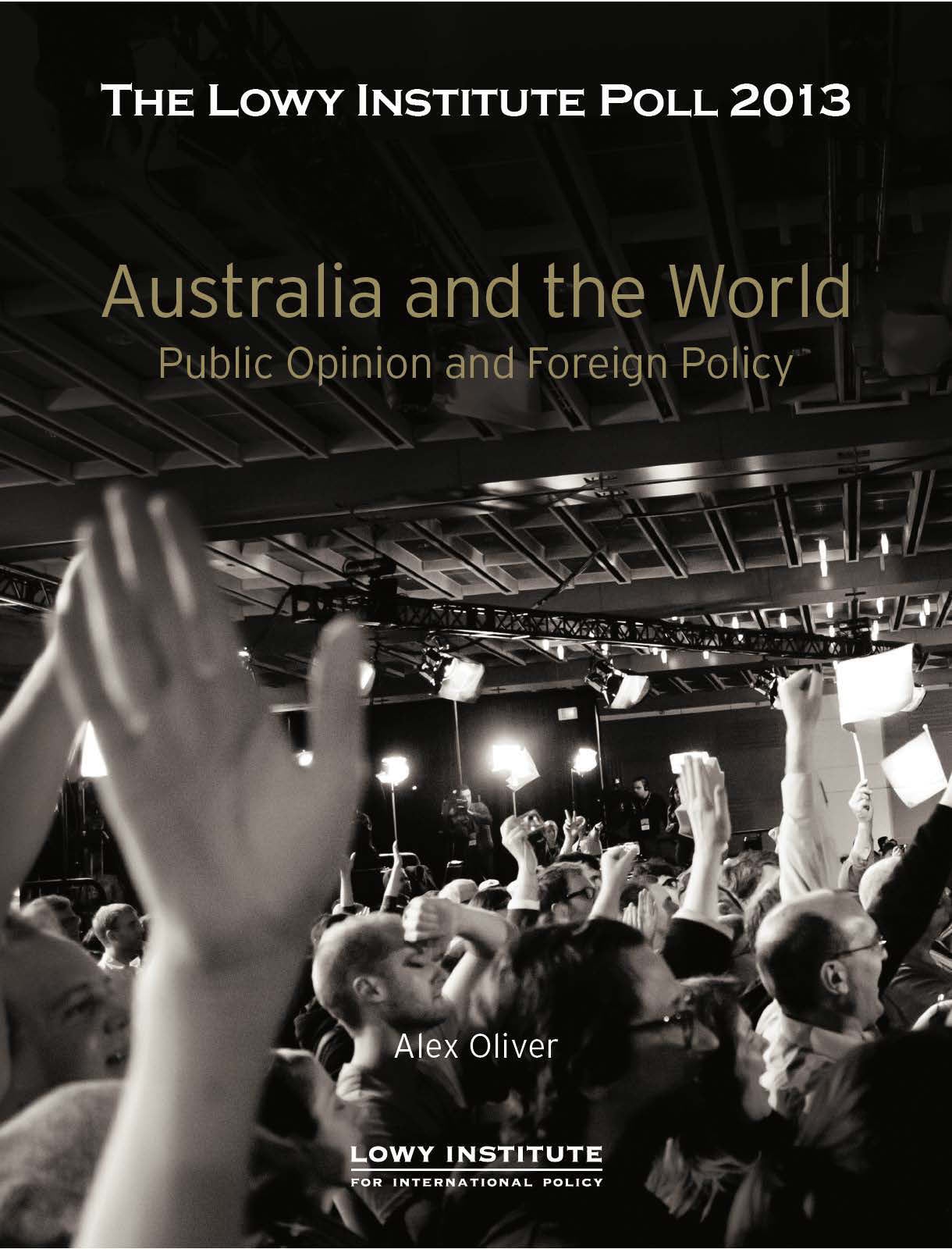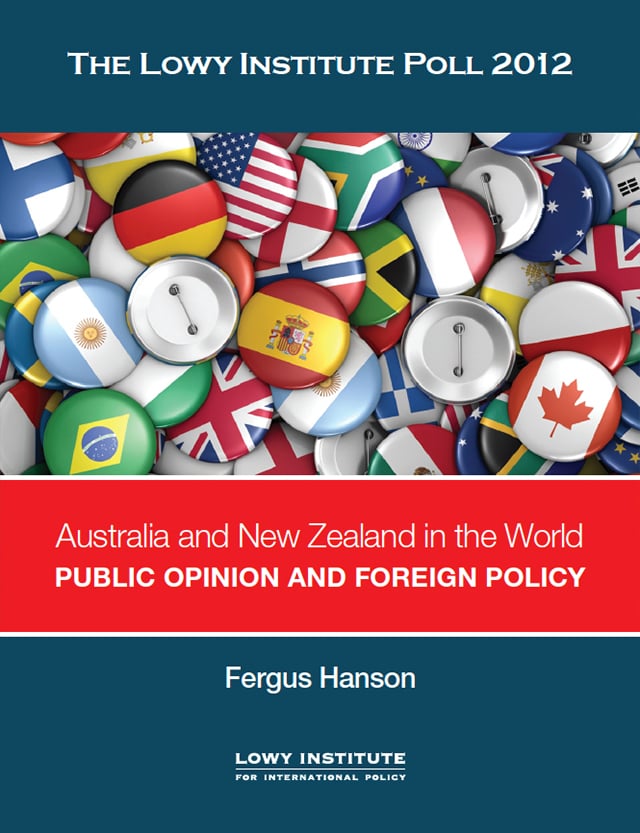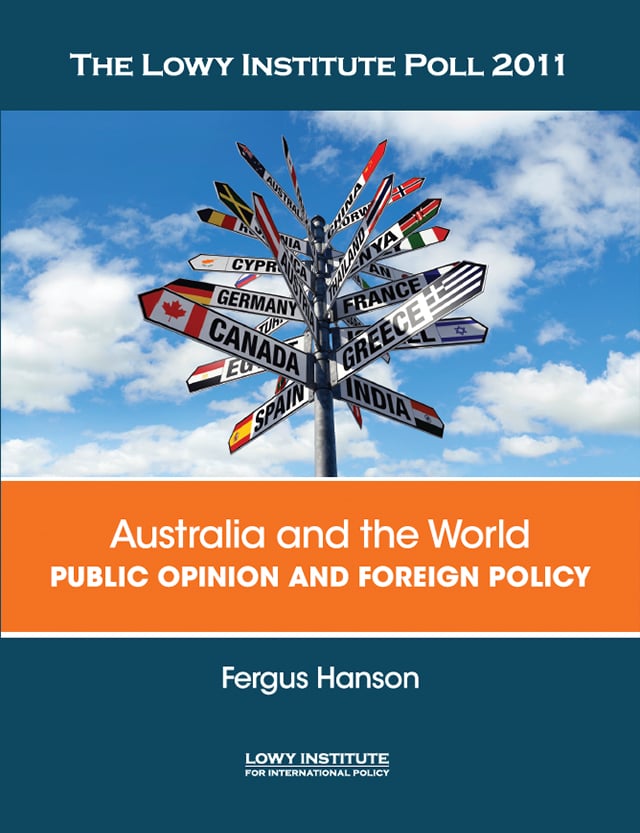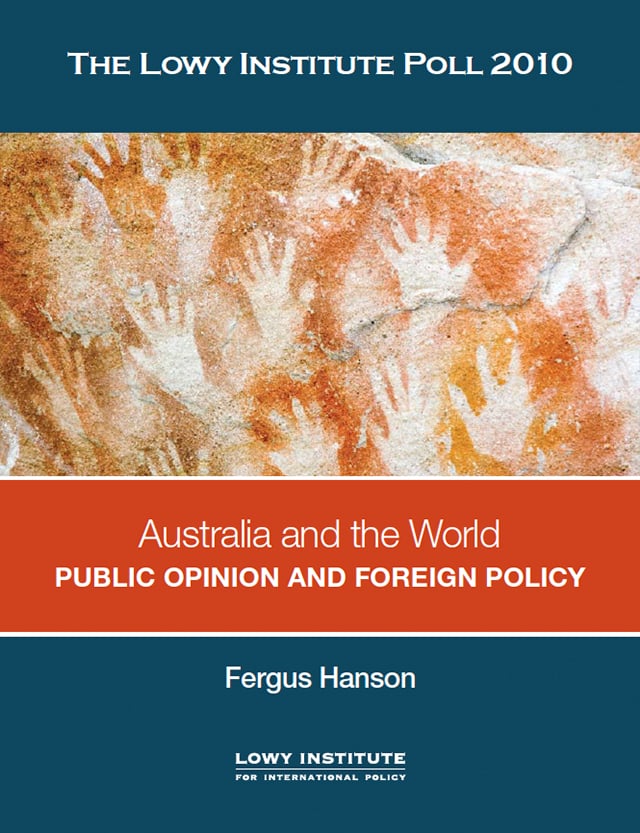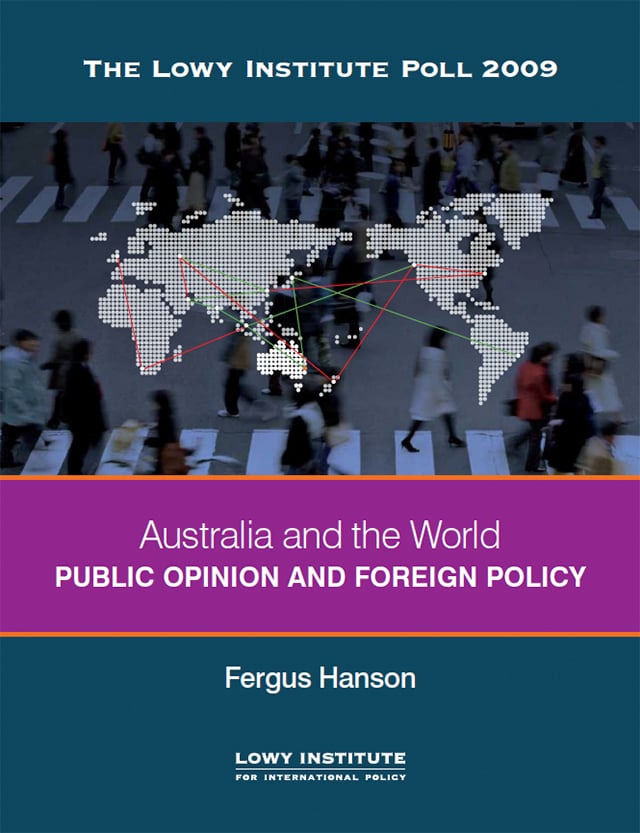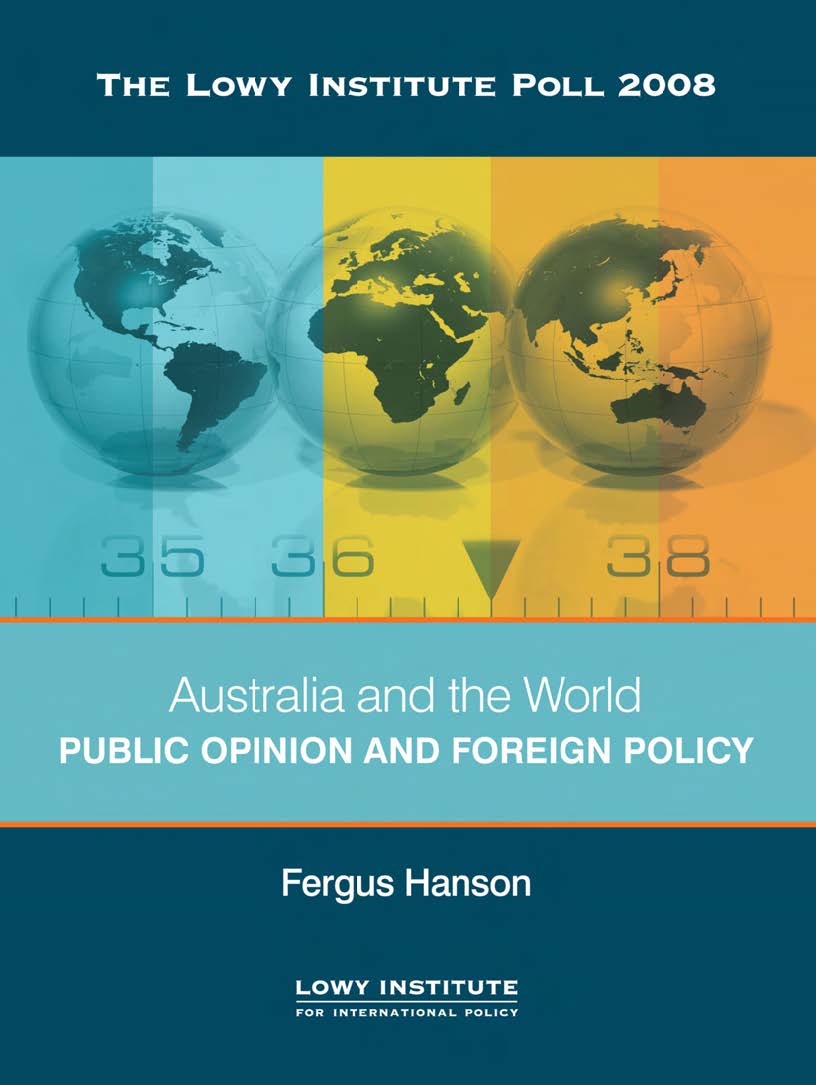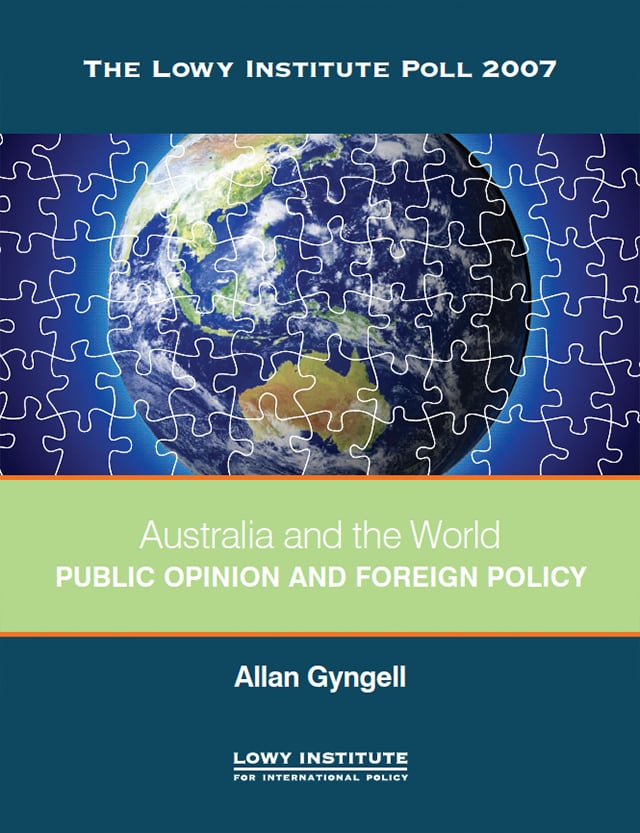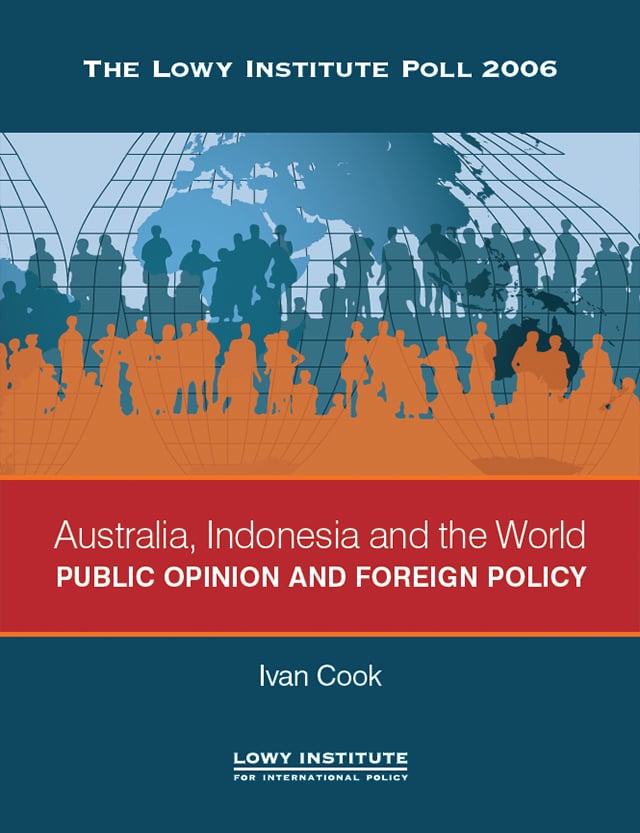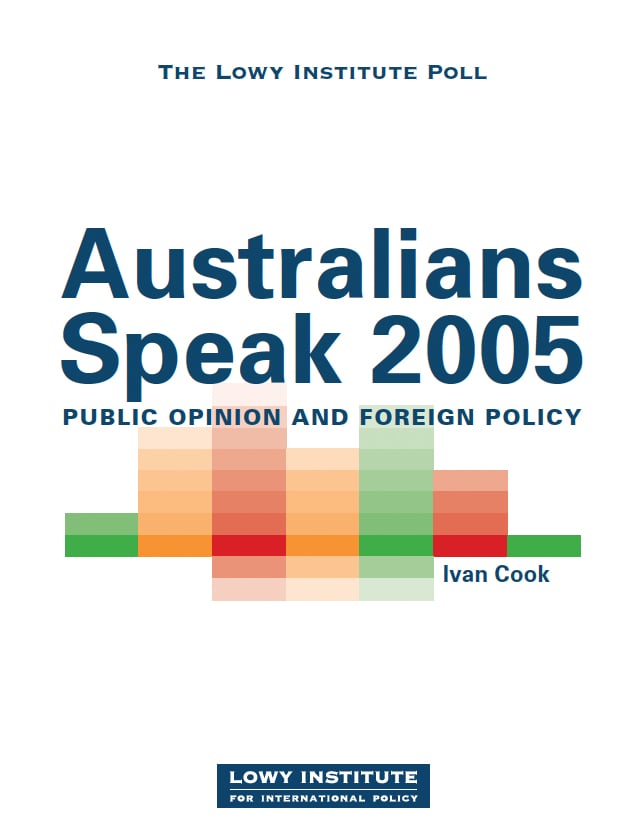Archive
Since 2005, the Lowy Institute has conducted annual polling of Australian views on foreign policy to inform public debate. The annual Lowy Institute Poll is one of the Lowy Institute’s flagship publications, and the leading tracking survey on Australian public opinion and foreign policy. The Poll has identified significant shifts in public sentiment, such as on climate change and immigration, and has provoked vigorous debate on Australia’s relationships with China and the United States. In 2020, the Lowy Institute released all of the data from the history of the Lowy Institute Poll for public use.
21 years ·
336 questions ·
326,932
data points
Themes
Australia and the Pacific
Australian foreign policy
Australian government performance
China
Climate change and energy
Consular support
Covid-19 pandemic
Defence and security
Democracy
Economy and trade
Feelings towards other nations
Foreign aid
Global powers and world leaders
Immigration and refugees
Indonesia
Relations in the Indo-Pacific
Safety and threats
Societal issues
United States
A
Acquiring nuclear weapons
Acquiring nuclear-powered submarines
Admiration for world leaders
Air strikes against Islamic State
Air strikes on Iran’s nuclear program
Alternative energy options
Amount of aid given to developing countries
Approach to Fiji sanctions
Arguments about unauthorised asylum seekers
Asylum seeker policy
Asylum seekers
Attending the Winter Olympics in China
Attention on the asylum seeker issue
Attitudes to China
Attitudes to Europe
Attitudes to fossil fuels
Attitudes to free trade
Attitudes to immigration
Attitudes to Indonesia
Attitudes to international trade
Attitudes to Papua New Guinea
AUKUS
Australia after the UN Security Council
Australia and New Zealand merger
Australia and the Anglosphere
Australia and the financial crisis
Australia and the United States under President Trump
Australia in the G20 and UNSC
Australia in the Pacific
Australia in the UN Security Council
Australia–China ministerial contact
Australia–China relations
Australia’s 2050 energy mix
Australia’s approach to international climate change negotiations
Australia’s approach to multilateral climate negotiations
Australia’s best friend in Asia
Australia’s best friend in the world
Australia’s bid for a UNSC seat
Australia’s bilateral relationships
Australia’s bilateral relationships under the Rudd government
Australia’s climate policies and reputation
Australia’s compliance with international law
Australia’s foreign policy priorities
Australia’s free trade negotiations
Australia’s humanitarian policy options
Australia’s influence in the world
Australia’s influence under the Rudd Government
Australia’s intelligence agencies
Australia’s involvement in Afghanistan
Australia’s involvement in Iraq
Australia’s place in the world
Australia’s population
Australia’s reputation overseas
Australia’s response to the war in Ukraine
Australia’s role in international institutions
Australia’s role in the world
Australia’s role in world affairs
Australian assistance to Papua New Guinea
Australian government agencies
Australian government policies towards China
Australian influence on US foreign policy
Australian media reporting about China
Australian policy towards Asia
Australian prime ministers and foreign policy
Australian relations with Pacific Islands countries
Australian renewable energy target
Australian responses to Asia’s growth
Australian values and foreign policy
Australian views of Brexit
Awareness of the G20
B
C
Changing importance of ANZUS
Changing US power
Characteristics of Australia
China as a military threat
China as the future leading power in Asia
China as the leading power in Asia
China: Australian policy settings
China: economic partner or security threat
China: emphasis on deterrence or stability
China’s economic future
China’s support in war on the Korean peninsula
China’s system of government
Chinese investment in Australia
Climate change
Climate change efforts by country
Close relations with Indonesia
Coalition government report card
Comfort with China leading Asia
Concern about climate change
Concern about Iran’s nuclear weapons
Confidence in world leaders
Confidence of aims in Afghanistan
Conflict between China and Japan
Consular assistance in dangerous events
Consular assistance to dual citizens
Consular support to Australians
Continued military involvement in Afghanistan
Continued military involvement in Iraq
Costs and benefits of climate change action
Costs and benefits of war in Afghanistan
Costs and benefits of war in Iraq
Criteria for new migrants
Cultural diversity
D
Data retention legislation and privacy
Dealing with China’s rise
Declining US economic power
Declining US political power
Defence spending
Defence strategy
Democracies around the world
Democracy
Democracy in the Middle East
Democracy or economy
Direct action or emissions trading scheme
Domestic interests and global cooperation
Donald Trump: optimism
E
F
Federal government foreign policy performance
Federal government’s efforts on climate change
Feelings of safety
Feelings towards other nations
Female leaders in the world
Foreign acquisitions of farmland
Foreign aid for Covid-19 vaccines
Foreign aid to the Pacific
Foreign influence in Australian politics
Foreign investment and Australian regulation
Foreign investment by country
Foreign investment by sector
Foreign investment in Australian real estate
Foreign military based in Australia
Foreign technology in Australia
Free trade agreement with Japan
Free trade agreement with the United States
Free trade negotiations with China
Freedom of navigation in the South China Sea
Future intervention in Pacific
Future roles of the United States and China
Future sources of electricity
G
Global abolition of the death penalty
Global cooperation during crises
Global nuclear disarmament
Global power in the post-crisis period
Global powers and influence in Asia
Global powers and influence in the world
Global responses to Covid-19
Global risk priorities for Australia
Globalisation
Goals of Australian foreign policy
Goals of military involvement in Afghanistan
Goals of military involvement in Iraq
Good relations with the US and China
Government attention paid to public opinion
Government responses to the execution of Australians overseas
Government spending on defence
Government’s ability to deal with global warming
Government’s response to terrorism
H
I
Ideal foreign aid spending
Ideal form of government
Immigration after Covid-19
Immigration and national identity
Immigration rate
Impact of foreign policy on everyday life
Importance of Australia in the G20
Importance of climate change goals for Australia
Importance of human rights in Australia
Importance of Indonesia to Australia
Importance of other economies to Australia in the future
Importance of other economies to Australia today
Importance of positive views of Australia
Important criteria for new migrants
Important issues facing Australia
Important security partners for Australia
India: Australia’s relationship priorities
Indian student attacks
Indigenous Voice
Indonesia and Australia
Indonesia and democracy
Indonesia as a threat
Indonesia’s relationship with Australia
Influence in Pacific Island countries
Influence of female leaders in the world
Influence of the United States
International reputation after election
International students in Australia
Iran and uranium
J
K
L
M
N
Nauru and Manus Island policy
Net zero: economic opportunity or cost
New submarines
News about foreign relations
North Asian free trade agreements
Nuclear energy
Nuclear power in Australia
Nuclear weapons in Australia
Nuclear-powered submarines and regional stability
Nuclear-powered submarines: cost
O
P
Performance of the Rudd Government
Policies of President Trump
Policy priorities with Indonesia
Policy responses to Iran’s nuclear program
Potential Chinese military base in the Pacific
Potential conflict over Taiwan
Potential federal government policies on climate change
Potential military conflict between China and the United States
Preference for closer security relations
Problem of climate change
Q
R
Reasons against foreign investment from China
Reasons for not preferring democracy
Reasons for opposing an emissions trading scheme
Reasons for reducing Chinese investment
Reasons for reducing immigration
Reasons for unfavourable opinions of the US
Reasons to view China as a threat
Reduction of emissions ahead of global agreement
Regional views on US soldiers in Darwin
Relations with superpowers
Relations with superpowers: United States and China
Reliability of the US security guarantee
Removal of Emissions Trading Scheme
Renewables and energy supply
Republic and head of state
Respect for the United States
Response of authorities to Covid-19
Responses to Iran’s nuclear program
Restarting dialogue with Fiji
Risks and benefits of artificial intelligence
Role of the US in the next decade
Russia’s invasion of Ukraine
S
Satisfaction with democracy in Australia
Satisfaction with the direction of the world
Similarities between Australia and New Zealand
Skilled worker visas
Social media and democracy
Sources of information during Covid-19
Sources of international news
Special forces remaining in Afghanistan
Spying practices
Superpowers in the future
Supply chains
Support for free trade
Support for size of aid budget
T
Temporary migrant worker schemes
Tensions in the Australia-China relationship
Tensions in the Australia-France relationship
Terrorism as a threat to Australia’s interests
The influence of the ‘West’
The Quad
The United States as a ‘world policeman’
The world’s leading superpower
Threats to Australia’s security
Threats to Australia’s vital interests
Trade policy and foreign investment
Trajectory of Indonesia’s democracy
Trust in global powers
Trust in the United States
U
UN-authorised military intervention
Unauthorised asylum seekers
United Kingdom and Brexit
United Kingdom leaving the European Union
United States’ defence of Australia
Uranium exports and nuclear waste
Uranium exports to signatories of the Non-proliferation Treaty
Urgency of climate change
US alliance: effect
US alliance: importance to Australia’s security
US and UN influence on Australian foreign policy
US as the ‘world’s policeman’
US elections and Australia’s interests
US military base in Australia
US power in the coming decade
US presidential candidates and foreign policy
US presidential elections: Democrats vs Republicans
US soldiers based in Darwin
US–China technological competition
Use of Australian military forces
V
W
#
Tags
Afghanistan
Alliances
Anglosphere
ANZUS
Asia-Pacific
AUKUS
Australia-China relations
Australia’s bilateral relations
Australia’s influence
Australian foreign policy
Authoritarianism
Autocracy
Blackouts
Border policy
Border security
Brexit
Budget
Budget priorities
Canada
Carbon tax
China
Clean coal
Climate change
Coal
Consular
Coronavirus pandemic
Covid-19
Critical infrastructure
Cyberattacks
Death penalty
Defence spending
Democracy
Development assistance
DFAT
Diplomacy
Diplomatic service
East Timor
Ebola
Economic and trade policy
Economy
Egypt
Electricity
Emissions trading scheme
Energy
Environment
Epidemics
Espionage
Europe
European Union
Extremism
Fake news
Feminist foreign policy
Fiji
Five eyes
Foreign aid
Foreign bases
Foreign influence
Foreign interference
Foreign investment
Foreign military bases
Foreign technology
Fossil fuels
France
Free trade
G20
Gas-fired recovery
Germany
Global financial crisis
Global warming
Globalisation
Government spending
Hong Kong
Human rights
Immigration
India
Indigenous issues
Indo-Pacific
Indonesia
Infrastructure
Intelligence
International law
International students
Iran
Iraq
Islamic State
Italy
Japan
Journalists
Malaysia
Maritime security
Media
MH17
Middle East
Military
Multilateralism
New submarines
New Zealand
North Korea
Nuclear power
Nuclear proliferation
Nuclear weapons
Pacific Islands
Pakistan
Papua New Guinea
Peacekeeping
Philippines
Poverty alleviation
Protectionism
Qantas
Quadrilateral Security Dialogue
RAMSI
Recession
Refugee policy
Relations with the US and China
Renewable energy
Russia
Sanctions
Security and defence
Singapore
Societal issues
Soft power
Solomon Islands
Sources of news
South China Sea
South Korea
Southeast Asia
Sri Lanka
Syria
Taiwan
Terrorism
The Quad
Threats
Travel
Trust in global powers
Ukraine
United Arab Emirates
United Kingdom
United Nations
United States
Vaccines
Values-based foreign policy
Vanuatu
War
World Health Organization
World leaders and countries
